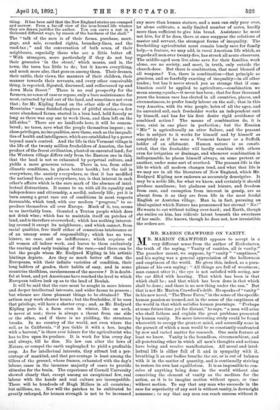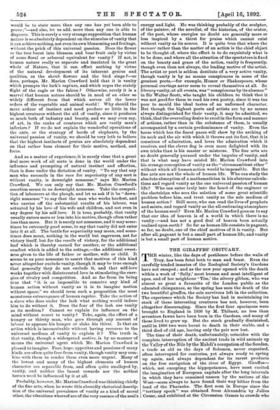MR. MARION CRAWFORD ON VANITY.
MR. MARION CRAWFORD appears to accept in a very different sense from the author of Ecclesiastes, the truth of the saying, "Vanity of vanities, all is vanity." The preacher meant, we suppose, by " vanity " "emptiness,'
and his saying was a general appreciation of the hollowness and emptiness of the world. He gives this, indeed, as a para-
phrase of his own saying : "All things are full of weariness ;
which shall be ; and that which has been done is that which
shall be done ; and there is no new thing under the sun." But that is not Mr. Marion Crawford's drift. He speaks of "vanity" in his new novel, "The Three Fates," in the sense of the specific human passion so termed, not in the sense of the emptiness of the world in that which satisfies human yearnings. "Perhaps at some future time yet far distant," he says, "a man will arise
who shall fathom and explain the great problems presented by human vanity. No more interesting study could be found wherewith to occupy the greatest mind, and assuredly none in the pursuit of which a man would be so constantly confronted by new and varied matter for research. One main feature at
least we know. Vanity is the boundless, circumambient, and all-penetrating ether in which all men's thoughts and actions have being and receive manifestation. All moral and intel- lectual life is either full of it and in sympathy with it,
breathing it as our bodies breathe the air, or is out of balance with it in the matter of quantity, and is continually striving to restore its own lost equilibrium. It is as impossible to con- ceive of anything being done in the world without also conceiving the element of vanity as the medium for the
action, as it is to imagine motion without space, or time without motion. To say that any man who succeeds in the race for superiority of any sort is without vanity, is downright nonsense ; to say that any man can reach success without it
would be to state more than any one has yet been able to prove ;"—and also, let us add, more than any one is able to disprove. This is surely a very strange supposition that human nature is so absolutely dependent on the stimulus of vanity that it can achieve nothing, not even its own blossoming and fruitage, without the prick of this universal passion. Does the flower or the tree burst into blossom and bear fruit only by virtue of some floral or arboreal equivalent for vanity ? If not, is human nature really so separate and insulated in the great whole of Nature, that it can effect nothing by virtue of the natural development of its inherent genius and qualities, as the shrub flowers and the bird sings ?—or does, perhaps, Mr. Marion Crawford hold that it is vanity which prompts the lark's rapture, and which urges the stately flight of the eagle or the falcon ? Otherwise, surely it is a marvel that human nature should be in need of an ether so widely different from that which serves all the lower orders of the vegetable and animal world ! Why should the mere ardour of instinct and need produce so little in the highest creatures without the aid of vanity, since it produces so much both of industry and beauty, and we may even say, of art, in the ranks of creatures which are vastly man's inferiors ? If we do not explain the wonderful operations of the ants, or the strategy of herds of elephants, by the universal passion of vanity, we should be very loth to believe that the highest instincts of genius are absolutely dependent on that rather base element for their motive, method, and force.
And as a matter of experience, it is surely clear that a great deal more work of all sorts is done in the world under the influence and prompting of natural instinct and affection, than is done under the dictation of vanity. "To say that any man who succeeds in the race for superiority of any sort is without vanity, is downright nonsense," says Mr. Marion Crawford. We can only say that Mr. Marion Crawford's assertion seems to us downright nonsense. Take the competi- tion of labourers at the plough, and let us ask if it be "down- right nonsense" to say that the man who works hardest, and who carries off the substantial results of his labour, was actuated by his love of his wife and children, and not even in any degree by his self-love. It is true, probably, that vanity usually enters more or less into his motive, though often rather less than more. But it is surely not nonsense, and it may some- times be extremely good sense, to say that vanity did not enter into it at all. The battle for superiority may mean, and some- times does mean, nothing in the world but eagerness, not for victory itself, but for the results of victory, for the additional loaf which is thereby earned for another, or the additional comfort which is added to the cottage,—the additional sweet- ness given to the life of father or mother, wife or child. It seems to us pure nonsense to assert that motives of this kind never altogether exclude vanity, though it may be true enough that generally they do not exclude it, and that self-love works together with disinterested love in stimulating the ener- gies of rivalry and competition. And so far from its being true that "it is as impossible to conceive any kind of human action without vanity as it is to imagine motion without space," we should term such a proposition the most monstrous extravagance of human caprice. Take the action of a slave who does under the lash what nothing would induce him to do without it. Does the fear of the lash use :vanity as its medium? Cannot we explain its influence on the mind without resort to vanity ? Take, again, the effort of a hungry or thirsty man, who goes through any amount of labour to appease his hunger or slake his thirst. Is that an action which is inconceivable without having recourse to the universal medium of vanity to explain it ? The truth is, that vanity, though a widespread motive, is by no manner of means the universal agent which Mr. Marion Crawford is pleased to imagine. Fear, hope, appetites and passions of many kinds, are often quite free from vanity, though vanity may com- bine with them to render them even more urgent. Many of the lowest and many of the highest elements of human character are separable from, and often quite unalloyed by, vanity, and neither the basest cowards nor the noblest heroes need be influenced by it at all.
Probably, however, Mr. Marion Crawford was thinking chiefly of the fine arts, when he wrote this absurdly rhetorical descrip- tion of the universal prevalence of vanity as a kind of moral ether, the vibrations whereof are of the very essence of the soul's energy and light. He was thinking probably of the sculptor, of the painter, of the novelist, of the historian, of the orator, of the poet, whose energies no doubt are generally more or less inspired by a thirst for praise which cannot exist without vanity as its source. It is quite true that where the manner rather than the matter of an action is the chief object to be thought of, where the effort is to do exquisitely what is to be done, and where all the attention of the spectators is fixed on the beauty and grace of the action, vanity is frequently, though even then not always, the leading motive of the artist. The artist or poet is seldom destitute of a very active vanity, though vanity is by no means conspicuous in some of the greatest poets,—for example, Homer or Shakespeare, whose personal cravings never seem to reveal themselves at all. So literary vanity, at all events, was" conspicuous by its absence" in Sir Walter Scott, who taught his children to think that it was not good for them to read his own poetry, since it was too poor to mould the ideal tastes of an unformed character. But though the highest poets and artists are by no means always distinguished for their vanity, it may be admitted, we think, that the overruling desire to excel in the form and manner of actions, rather than in the substance of them, is usually accompanied by a certain predominance of vanity. Even the horse which has the finest paces will show by the arching of its neck and the air with which it throws out its feet, that it is conscious of admiration, and loves the admiration which it receives, and the clever dog is even more delighted with its own tricks than is his master or mistress. The fine arts are no doubt generally pursued under the impulse of vanity, and that is what may have misled Mr. Marion Crawford into his strange conception of vanity as the " circumambient ether" without which all human action would be impossible. But the fine arts are not the whole of human life. Who can study the absolute absorption of a mathematician in his abstruse calcula- tions and regard vanity as the one universal passion of human life? Who can enter truly into the heart of the engineer or the electrician who sees the solution of some great scientific problem before him, and treat vanity as the sole medium of human action ? Still more, who can read the lives of prophets and saints, and regard vanity as the all-embracing atmosphere of the human soul ? Even Mr. Marion Crawford goes on to say that our idea of heaven is of a world in which there is no vanity :—and has not a good deal of heaven been actually realised upon earth ? So far as human life consists in pageant, so far, no doubt, one of the chief motives of it is vanity. But after all, pageant is but a small part of human life, and vanity is but a small part of human motive.

































 Previous page
Previous page